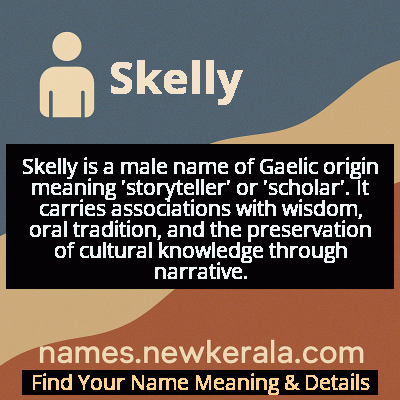Skelly Name Meaning & Details
Origin, Popularity, Numerology Analysis & Name Meaning of Skelly
Discover the origin, meaning, and cultural significance of the name SKELLY. Delve into its historical roots and explore the lasting impact it has had on communities and traditions.
Name
Skelly
Gender
Male
Origin
Gaelic
Lucky Number
3
Meaning of the Name - Skelly
Skelly is a male name of Gaelic origin meaning 'storyteller' or 'scholar'. It carries associations with wisdom, oral tradition, and the preservation of cultural knowledge through narrative.
Skelly - Complete Numerology Analysis
Your Numerology Number
Based on Pythagorean Numerology System
Ruling Planet
Jupiter
Positive Nature
Optimistic, inspirational, and creative.
Negative Traits
Scattered, exaggerating.
Lucky Colours
Yellow, gold, purple.
Lucky Days
Thursday.
Lucky Stones
Yellow sapphire.
Harmony Numbers
1, 2, 9.
Best Suited Professions
Arts, writing, communication.
What People Like About You
Creativity, optimism.
Famous People Named Skelly
Michael Skelly
Renewable Energy Entrepreneur
Pioneered major wind energy projects across the United States
John Skelly
Irish Historian
Authored definitive works on Gaelic storytelling traditions
Patrick Skelly
Folk Musician
Revived traditional Irish storytelling through modern musical adaptations
Seán Ó Sceallaigh
Gaelic Scholar
Preserved ancient Irish oral histories and genealogical records
Name Variations & International Equivalents
Click on blue names to explore their detailed meanings. Gray names with will be available soon.
Cultural & Historical Significance
During the Gaelic revival of the 19th and 20th centuries, the name experienced renewed interest as Irish intellectuals sought to reconnect with their cultural heritage and storytelling traditions that had been suppressed during British rule. The name represents a direct link to Ireland's rich oral tradition, where knowledge was preserved not through written texts but through carefully memorized and ritually transmitted stories. This cultural significance extends beyond Ireland to the global Irish diaspora, where the name serves as a marker of cultural identity and a reminder of the importance of preserving one's heritage through narrative.
Extended Personality Analysis
Individuals named Skelly often exhibit strong communicative abilities and a natural inclination toward narrative and explanation. They tend to be articulate, persuasive, and possess excellent memory for details and sequences, making them effective teachers, writers, or public speakers. Their storytelling heritage manifests as creativity, imagination, and the ability to see patterns and connections that others might miss. This often makes them excellent problem-solvers who can approach challenges from multiple perspectives and explain complex concepts in accessible ways.
Skellys typically demonstrate intellectual curiosity and a respect for tradition while adapting ancient wisdom to modern contexts. They often serve as bridges between generations, preserving family stories and cultural knowledge while making them relevant to contemporary audiences. This combination of respect for the past and innovative thinking makes them valuable in fields requiring both historical perspective and forward-looking vision. Their natural empathy and understanding of human nature, derived from their storytelling instincts, often make them trusted confidants and effective leaders who can inspire others through compelling narratives about shared goals and values.
Modern Usage & Popularity
In contemporary times, Skelly has transitioned from primarily a surname to an increasingly popular given name, particularly among families with Irish heritage seeking to honor their ancestry. The name has seen steady growth in usage since the 1990s, with notable increases in Ireland, the United States, Canada, and Australia. Modern parents are drawn to Skelly for its unique sound, strong cultural roots, and the positive associations with wisdom and communication. It appeals to those valuing education, creativity, and cultural preservation. While still relatively uncommon, its usage has been boosted by the trend toward surname-first names and the broader revival of Gaelic names internationally. The name maintains particular popularity in academic and artistic communities where its storytelling connotations are especially appreciated, and it continues to gain traction as parents seek distinctive yet meaningful names with cultural depth.
Symbolic & Spiritual Meanings
Symbolically, Skelly represents the bridge between past and present, embodying the transmission of knowledge across generations. It symbolizes the power of narrative to shape identity, preserve history, and create community cohesion. The name carries connotations of wisdom, memory, and the sacred responsibility of cultural preservation. Metaphorically, it suggests someone who can find meaning in chaos, create order from random events, and help others understand their place in larger stories. The storytelling association makes Skelly symbolic of truth-seeking, authenticity, and the human need for narrative to make sense of experience. It represents the idea that our lives are stories being written and that understanding our personal narratives helps us navigate the world more effectively, while also emphasizing the importance of preserving collective memory and cultural continuity in an increasingly fragmented modern world.

